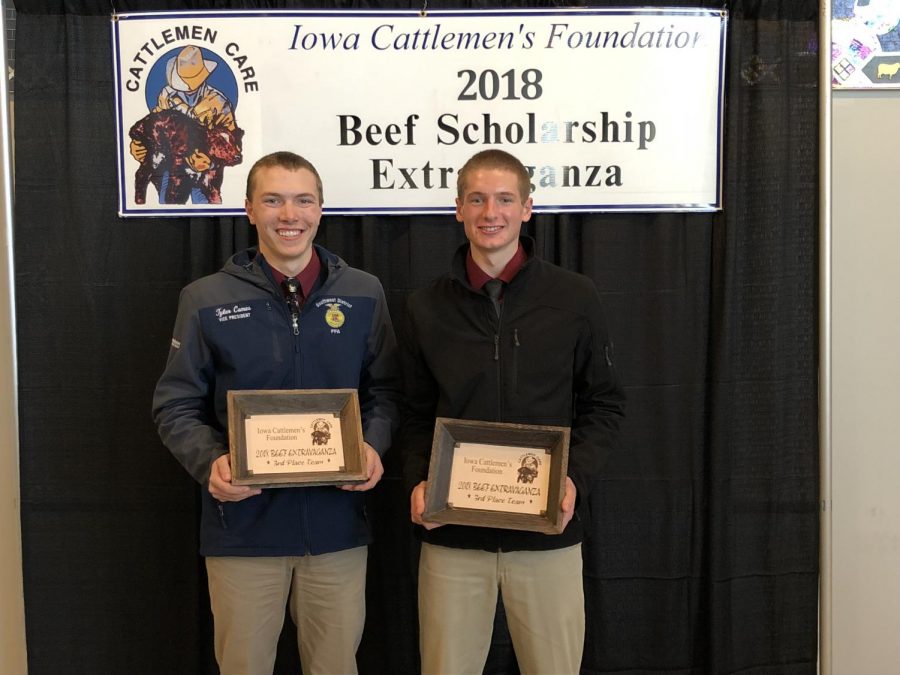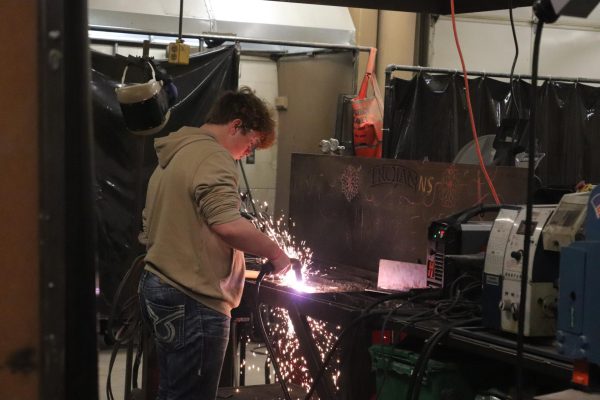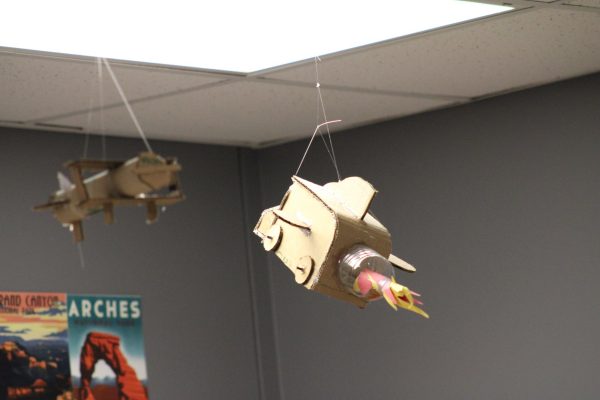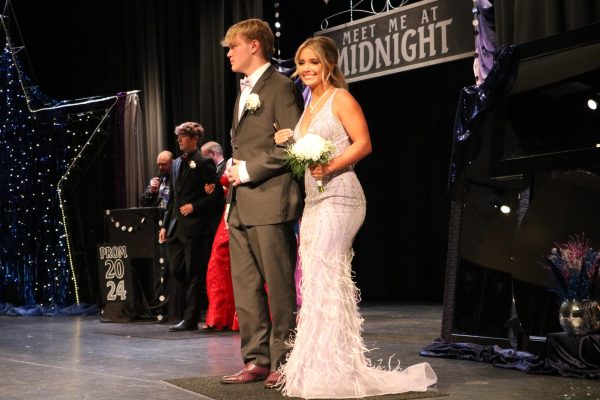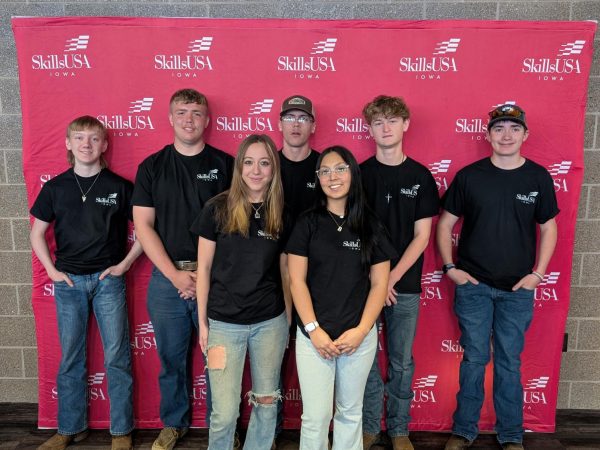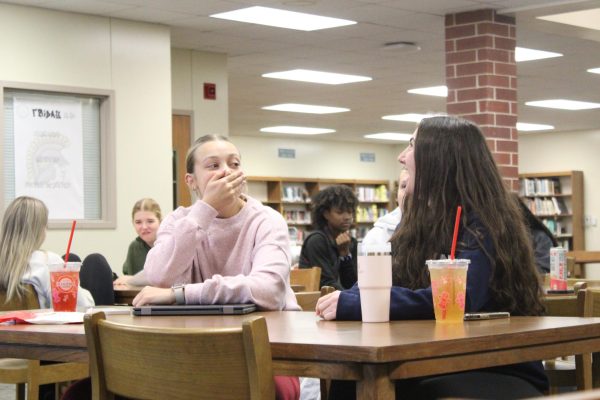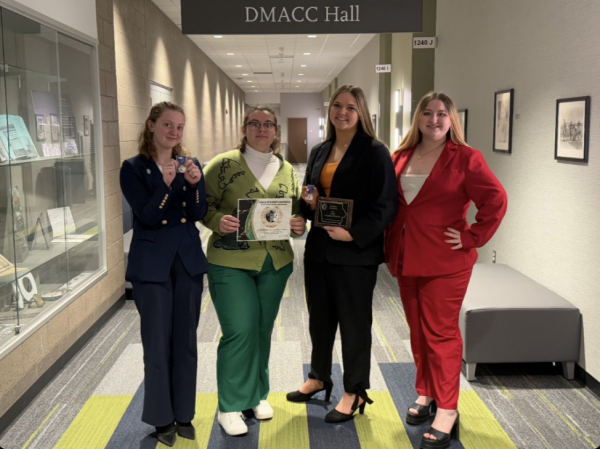Atlantic FFA Members Compete 2018 Beef Extravaganza
Atlantic senior duo of Tyler Comes and Nathan Behrends place third at the Beef Extravaganza.
On Wednesday, Dec. 5, members of the Atlantic FFA participated in the Iowa Cattlemen’s Foundation Beef Extravaganza. Team members Nathan Behrends and Tyler Comes placed third overall, while team members Carli Henderson, Tate Den Beste and Zade Niklasen placed 13 out of 20 teams. The Beef Scholarship Extravaganza is open to high school juniors and seniors where students are tested on their knowledge and skills about 10 different areas of the beef industry. Teams worked through ten 25-minute stations with five-minute breaks between each station. Atlantic FFA Advisor Eric Miller said, “This is the hardest event I help teams prepare for. The amount of time these kids have devoted to this contest is unbelievable. I am proud of how hard all four of them worked.”
In station one, Health and Handling, team members took a written test about effective stockmanship for handling of cattle and proper health-related practices including, but not limited to, proper vaccination procedures and protocols, dose administration and equipment selection, parasite control, castration procedures and other health-related practices essential for the beef industry and animal welfare. New this year, they were also asked two verbal questions.
During station two, Nutrition, team members evaluated the body condition score of four cows and then assisted the station judge in balancing a feed ration for a real-life scenario. To prepare, students learned about body condition scoring, cattle nutrient requirements, the nutrient values of feedstuffs, and how to use that information to determine what diet will be the best for the exercise.
Station three focused on Marketing. This station required contestants to calculate yield and quality grades for carcasses, determine the value of a carcass, and determine values for lots of cattle. Team members should know the degrees of marbling necessary to achieve a final quality grade, assuming that all marbling calls are derived from A maturity carcasses. Students must be able to use adjusted fat thicknesses, rib eye areas (sq. in.), hot carcass weights, and KPH% (values provided) to calculate final yield grades.
Station four was the Seedstock Merchandising station. Team members demonstrated how to incorporate performance information, pedigrees, and phenotypes into a private treaty sales situation. Judges acted as buyers and team members had to identify the buyer’s needs, concerns, and goals in order to “sell” the bull or bulls.
The fifth station is the Keep-Cull Replacement Heifer station. During the first part of this station, team members evaluated expected progeny differences (EPDs) and visually appraised live cattle in order to choose four out of eight heifers to keep that would best fit the production scenario given to contestants. The scenario addressed the objectives and marketing scheme of the operation along with other management information. In the second component, teams answered questions about the set of heifers and their EPDs as well as their phenotypical features.
In station six, Job Interview, each student prepared a cover letter and resume and participated in a mock interview with an industry professional. By participating in this station, young people had the opportunity to explore career choices in the cattle industry.
Station seven, Beef Industry Issues and Advocacy, gave team members the opportunity to give a presentation shedding a positive light on an area of the beef industry. Subjects may have included Modern Beef Production, Animal Care, Beef Safety, Beef Nutrition, Environmental Stewardship, and The Beef Checkoff. Comes said, “I had an awesome time taking things that I learned from my own operation and applying it into a real-world application.”
In station eight, this year, the station contact, Marshall Ruble, stated this station is the equivalent of a sophomore-level college test at Iowa State University. This is why it is often considered the most difficult station at the competition. Students were tested on their knowledge of calving management practices such as pre-calving preparation, process of parturition, dystocia, equipment involved in reproductive practices, synchronization techniques, artificial insemination, embryo transfer and other technologies in this field.
In the Credit and Finance station, team members were provided with the experience of organizing, preparing and participating in a mock loan request. Teams met with financial officers and presented a description of a project along with completed financial data in support of the loan request. The project consisted of selecting one of three scenarios: purchasing 100 head of yearling steers to feed out, purchasing 20 bred cows to start a cow/calf business, or purchasing 100 head of heifer or steer calves, backgrounding them to 850 pounds.
The final station is the Beef Management Challenge. This challenge allowed students to tie information gained from the other stations of this competition together. It consisted of an informal discussion between team members and a judge, who assumed the role of a manager who needed advice about his or her cattle operation. The team members assumed a role of a hired consultant to provide advice for the fictitious beef enterprise. Behrends said, “It was a great experience and I learned a lot about the beef industry through this contest”
Team member Niklasen said, “It’s a lot of fun and you learn a lot. It is worth all the time and effort if you can get a chance to do it.” Henderson said, “It was a very educational and exciting event. Despite the long day, I was able to take away many new things I learned and hope to come back next year.” Den Beste said, “Beef Extravaganza was a fun and learning experience. My favorite station was the Beef Industry Issues and Advocacy.”
The team members would like to thank the Cass County Cattlemen for sponsoring both teams. In addition, they’d like to thank Jim Skartvedt, Renew Ag Supply, Courtney Brewer, Anita Vet Clinic, Bob and Raylynn Barkley, Aaron and Danna Saeugling, David York and their advisor Eric Miller for helping prepare them for the contest as well.

